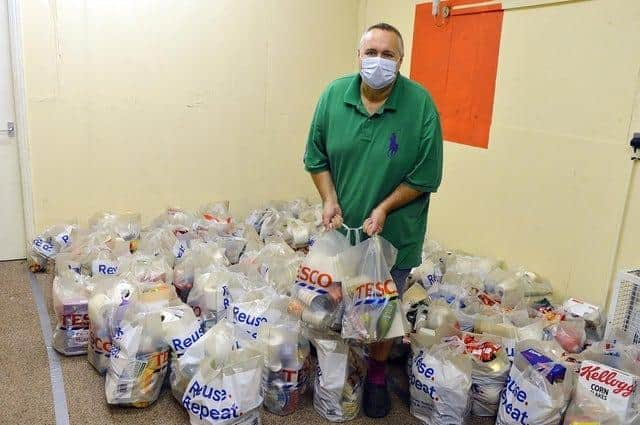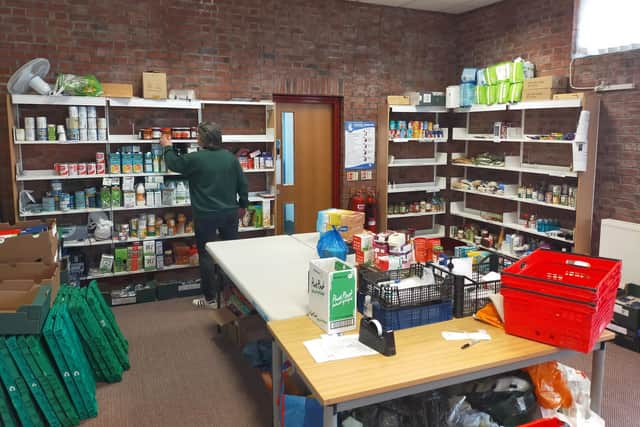Sheffield food banks: Families face winter heating only one room with food they can eat without cooking
and live on Freeview channel 276
Heating one room will have to do when there isn’t the gas to warm the whole home. Eating cold canned food will just have to get you by when there’s no electricity to cook it. Treasured household pets are given up for rehoming as another mouth to feed. And always, always, making sure that children eating comes first, even at the expense of their guardians. Too many families are learning that, even when they cut their household budget to the bone, it can still just not be enough.
These are stories from the front line of Sheffield’s food banks. Volunteers find themselves being a listening ear as often as a helping hand. They heard what their service users are going through – and more and more people are coming as winter approaches.
Advertisement
Hide AdAdvertisement
Hide Ad"We fed more people this August than we did last Christmas,” said Chris Hardy, a leading organiser from the S6 Foodbank. “And we’re expecting that number to rise in the coming weeks.”


S6 has seen an exponential rise in its users since 2020. It is now feeding an estimated 1,200 people a week, and that figure is expected to leap in their busiest period between January and March.
"October was the busiest we’ve ever had – and yet, it was less busy than we prepared for,” said Chris, who says the team had been expecting even more massive demand. “We saw a 15 per cent rise where we expected 25. I would say that’s because it was a warm October and because of the energy grants. But that just shows, if you put money in people’s pockets they don’t use food banks.
“We are starting to see more people living in just one room or asking for food they can eat without cooking because they can’t afford gas or electricity,” said Chris. “The mental health issue is skyrocketing. The effect of people week-in-week-out being unable to feed their children or keep the electricity on, or know where the next meal is coming from.”
Advertisement
Hide AdAdvertisement
Hide AdFood banks may be one of the few sectors – and it is a sector – actively trying not to exist. It would be a happy day when a food bank closes down because demand has disappeared. But, in what is both a net positive but a terrible sign, food banks are expanding. S6 Foodbank has now opened a ‘warm space’ for users during its sessions to come in from the cold, and is now trialing three days a week, with plans to bump these numbers up after December.


“It’s not always about the food either,” said volunteer Bethany Wilcox. “A lady came in really struggling with her mental health recently – she was white as a sheet and shaking with really bad anxiety. She sat down and one of our ambassadors really took the time to listen to her. When she left she was chatting again and smiling, for the meantime. Another man came in struggling because their boiler was broken, and an ambassador got on the phone to their utility provider and advocated for them through their customer service, and now it’s fixed.”
The latest figures say there is a “tsunami of need” in the Steel City, but donations are slow to keep pace with demand. The Star reported in April at the Burngreave Food Bank how donations skyrocketed during the pandemic, to the point they had “one office just for pasta”. Things have dipped since then – still trickling in, but not nearly enough.
Leading food bank collective The Trussell Trust, which has 15 locations in the Steel City, provided 29,795 parcels in the six months leading up to October in Sheffield – a third year of soaring numbers after demand rocketed four-fold in 2020. The charity has provided over 1.3m emergency parcels in the last six months but says demand is outstripping donations.
Advertisement
Hide AdAdvertisement
Hide AdThere has, at least, been a steady drumbeat of high-profile or successful appeals. On a recent gig to Sheffield, 70s Britpop band Squeeze collected 125kg of donations from their audience, as well as £1,045 in cash. It is understood certain Parkruns in the city will be holding monthly collections, and dance group Diversity is asking for food bank donations at their show at the Utilita in February.
But it all comes as a survey of 3,000 adults by the Money and Pensions Service found one in six had nothing at all in their bank account in case they were hit with a sudden bill, and one in four only had up to £100 set aside.
Emma Revie, chief executive of The Trussell Trust, said: “People are struggling to afford the essentials and we are expecting that this winter will be the hardest yet for food banks and the people they support.
“The public has continued to be generous with its donations, but food banks are having to buy twice as much food as they did last year and that, combined with rising operational costs, is making it hard for them to keep going.”
Advertisement
Hide AdAdvertisement
Hide AdA Government spokesperson said: “We are directly supporting households in need following the aftershocks from the pandemic and Putin’s illegal war in Ukraine, including sending another Cost of Living Payment this month worth £324 to over eight million people, part of a £1,200 package for those on the lowest incomes.
“Our extensive immediate support for families also includes our Energy Price Guarantee, saving around £700 for a typical household over winter, and our Household Support Fund, worth over £1 billion to help people with essential costs, combined with longer-term changes such as altering Universal Credit to help people keep £1,000 more of what they earn every year.”
Comment Guidelines
National World encourages reader discussion on our stories. User feedback, insights and back-and-forth exchanges add a rich layer of context to reporting. Please review our Community Guidelines before commenting.
